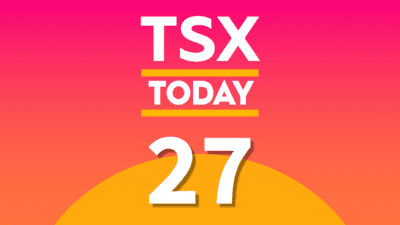The Bank of Canada delivered yet another “supersized” rate hike yesterday. The central bank bumped up the policy rate by 75 basis points, or 0.75%. The rate is now 3.25% — the highest it’s been since 2008.
We could be going higher. Here’s what the Bank of Canada plans to do next and the impact it could have on the investments in your Tax-Free Savings Account (TFSA).
Bank of Canada’s next moves
Tiff Macklem, the governor of the Bank of Canada, has made it clear that the central bank’s top priority is to tame inflation. Inflation is currently running at 7.6%. Canada hasn’t seen an inflationary wave this painful since the 1980s.
The reason for this is simple: there’s too much demand and too little supply. There are supply disruptions for everything from fuel to food. Meanwhile, government stimulus measures have created too much demand. Since the central bank can’t create more supply, its only option is to demolish demand.
Raising interest rates makes it difficult to borrow. It also encourages people to save more and spend less. That’s why the Bank of Canada has raised rates significantly and could push the policy rate beyond 4% by 2023.
Impact on TFSA stocks
Higher interest rates should push stock prices lower. Think about this: would you rather have 3.25% in dividends from a company or a guaranteed 3.25% interest payment from the government of Canada?
That’s the choice investors face today. Dividends and capital gains from stock are unreliable. The company’s net income or sales could decline. This is why stocks need to offer higher yields to justify the additional risk.
Stocks like Enbridge (TSX:ENB)(NYSE:ENB) seem to meet this benchmark. The energy pipeline giant has reliable cash flows and offers a 6.4% dividend yield. That’s nearly double the prime rate of interest.
Meanwhile, the stock price has moved 8.6% higher year to date. Enbridge has delivered a total return of 15% this year. That means the stock has performed better than
- The rest of the stock market (-9% year to date);
- Canada’s prime rate (3.25%); and
- Canada’s rate of inflation (7.6%).
Investors looking for a robust TFSA stock should keep an eye on this opportunity.
Impact on GICs
Higher interest rates make stocks less attractive, but they make savings accounts more attractive. Guaranteed Investment Certificates (GICs) and Term Deposits offer better returns when the policy rate moves higher.
EQ Bank now offers GIC rates up to 4.7% for five-year fixed terms. That rate is significantly higher than the average dividend yield of the TSX Index. The index offers just 2.85% in dividend yield. Not to mention that the dividend isn’t guaranteed for five years!
Adding a GIC to your TFSA could deliver better returns than a risky growth stock or a declining value stock in this environment. For pragmatic investors, it’s probably the best option.
Bottom line
The Bank of Canada raised interest rates by 0.75% yesterday. Rising rates push stock prices lower and make savings accounts more attractive. Choose your TFSA investments accordingly.








